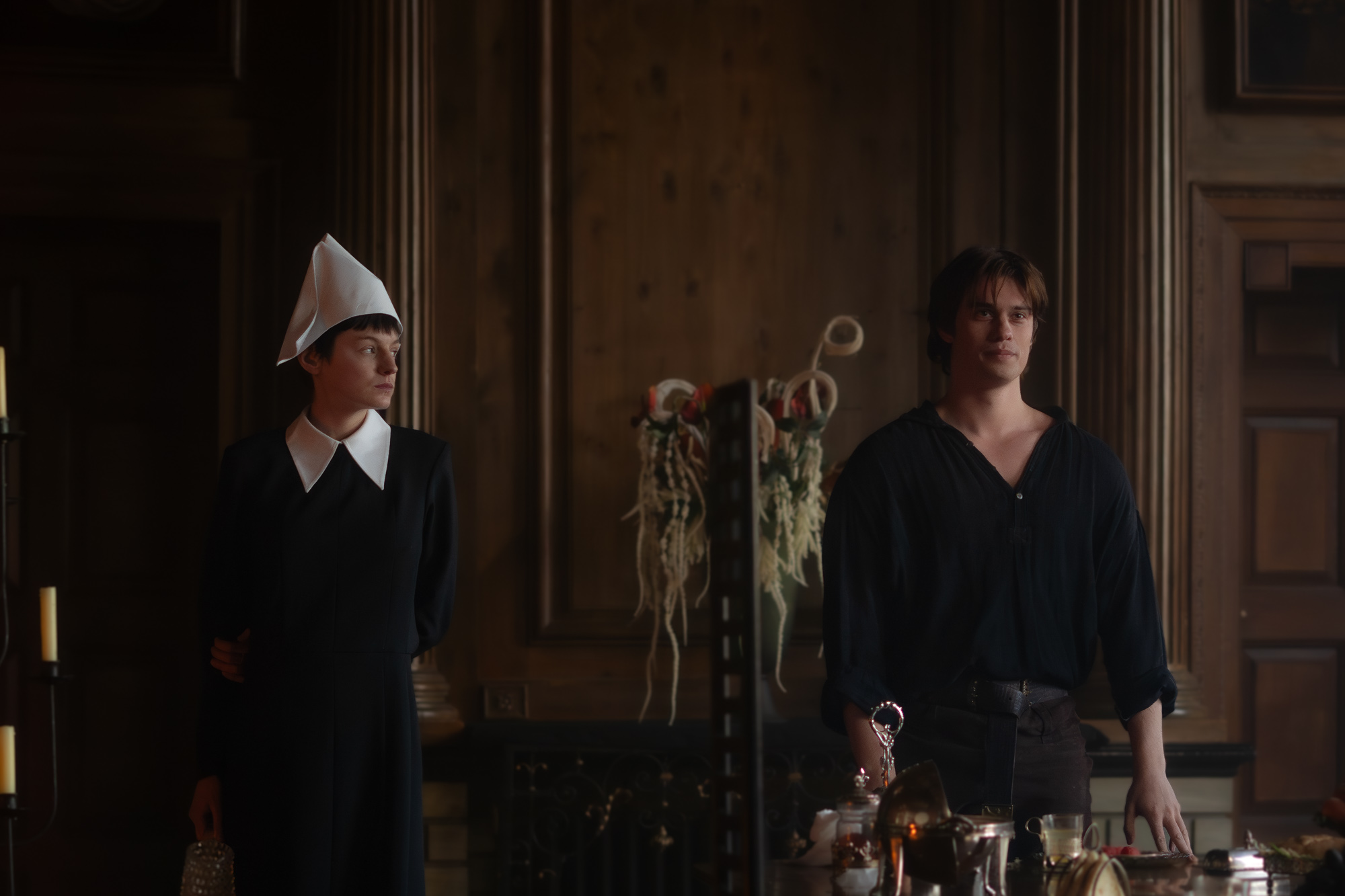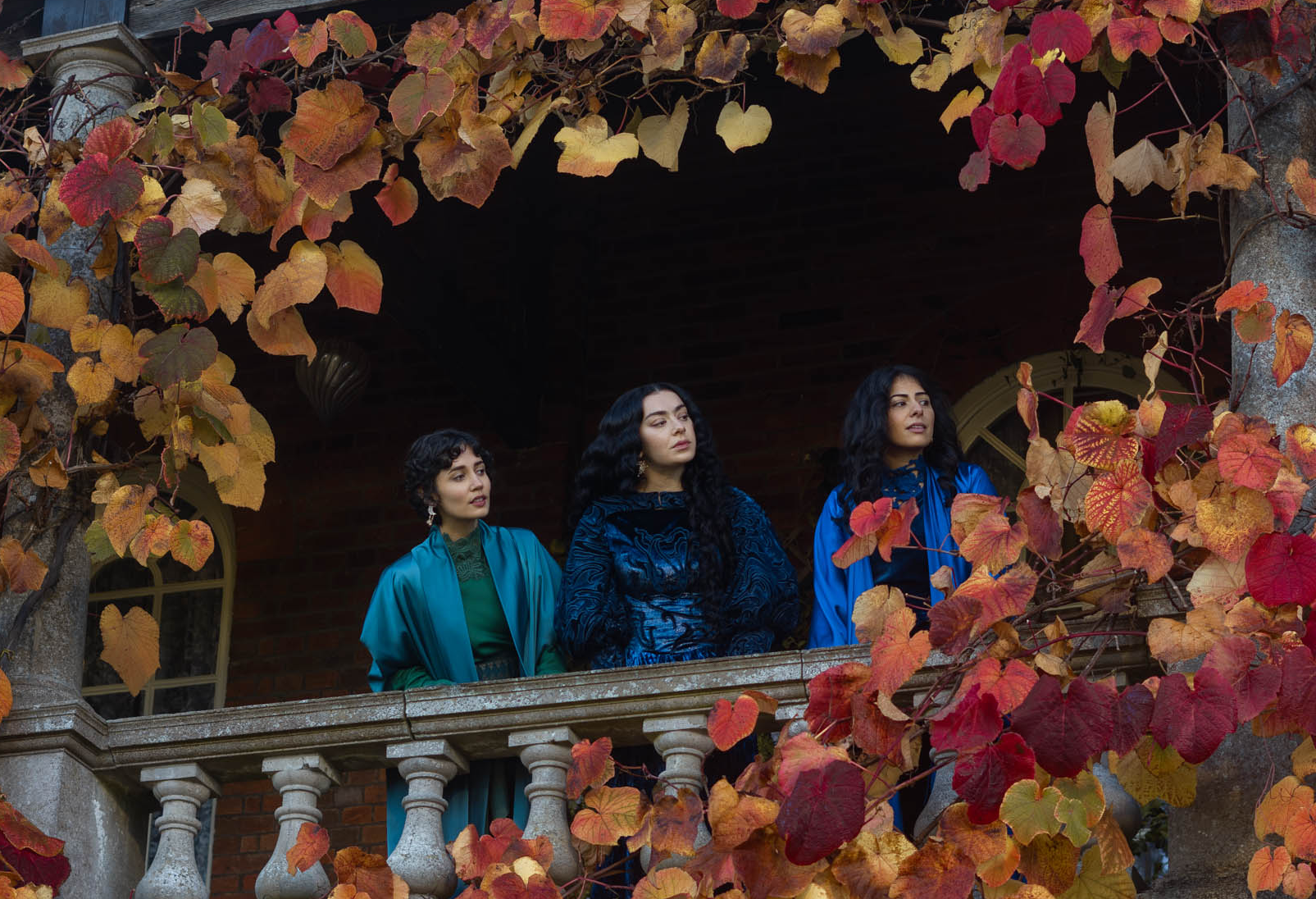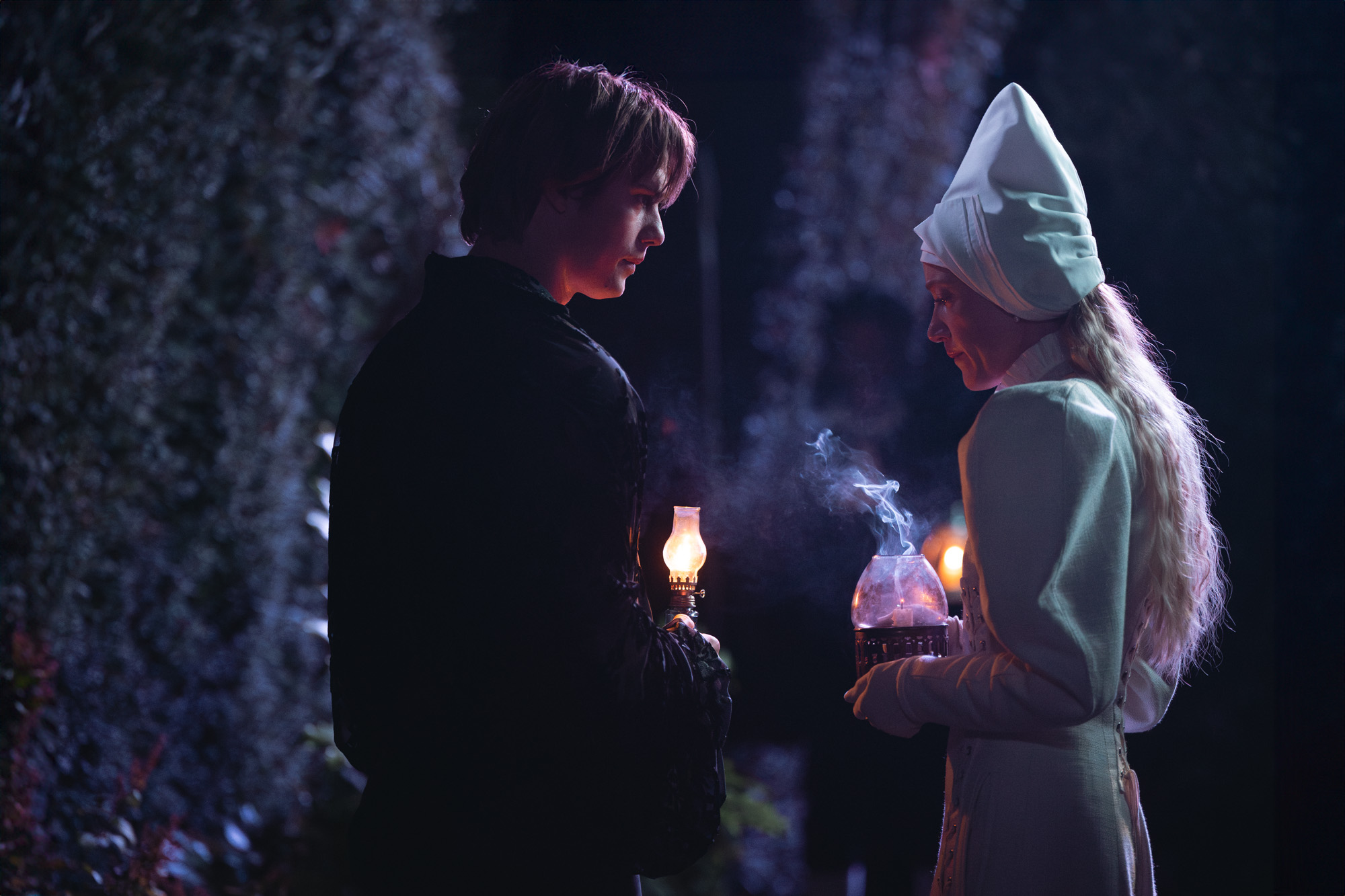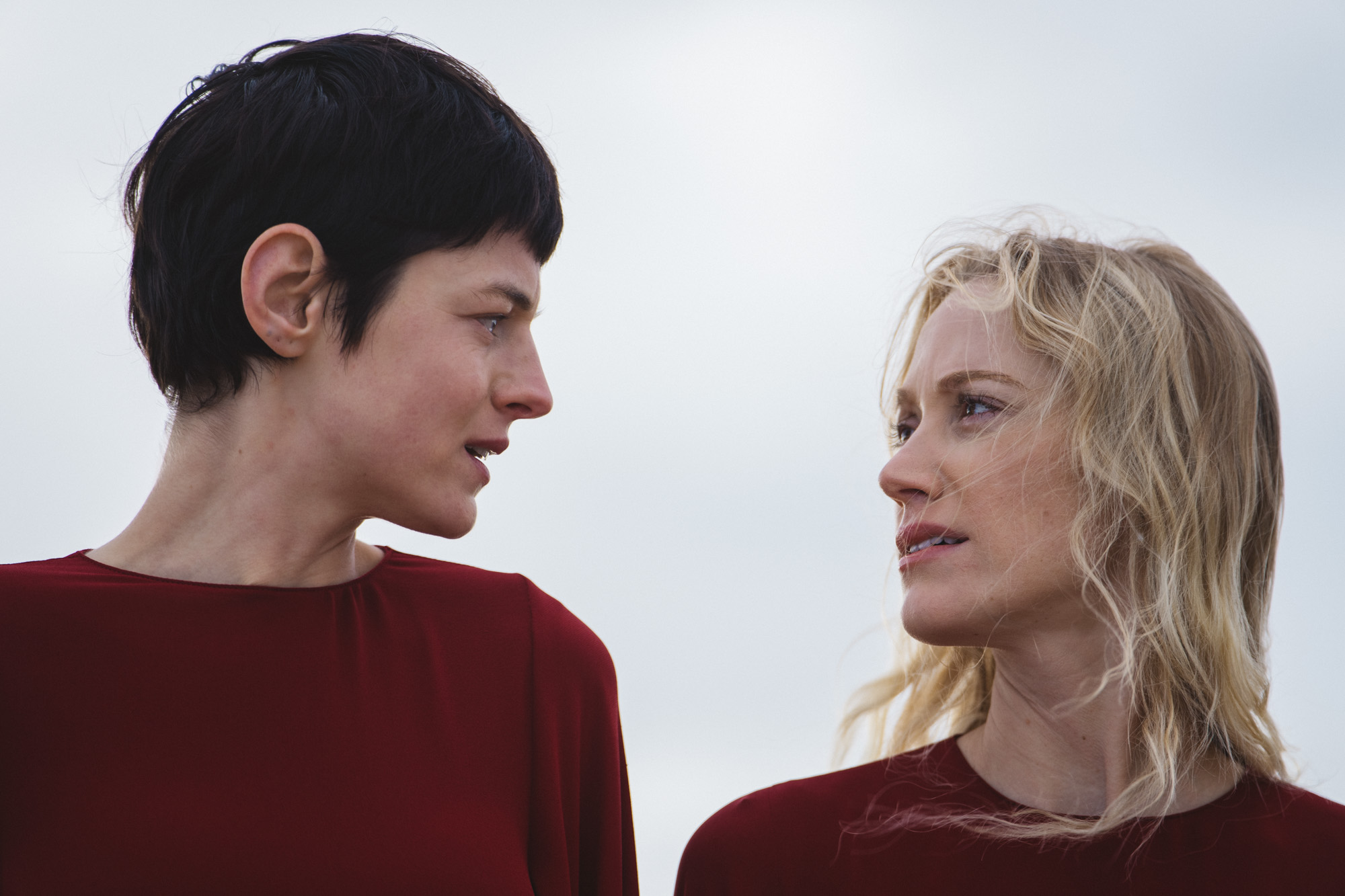

The British director discusses her adaptation of Isabel Greenberg’s beloved graphic novel 100 Nights of Hero, the closing film at this year’s London Film Festival.
Before she became a film director, Julia Jackman was a translator, turning scripts from English into Italian. Before long, translating scripts turned into film jobs, and film jobs started to outnumber translation jobs. Yet it is with a spirit of translation that Jackman has approached her second feature, which adapts Isabel Greenberg’s 100 Nights of Hero—itself an interpretation of the One Thousand and One Nights—into the language of cinema.
A queer fairy tale inflected with sci-fi and steam punk elements, 100 Nights of Hero tracks Cherry (Maika Monroe), a well-to-do woman in a sexless marriage who must bear an heir or face death. Meanwhile her husband makes a bet with a stupid-but-hot Lord Manfred (Nicholas Galitzine) that he cannot seduce her while he goes away. Enter Hero. Her maidservant (played with theatrical deftness and stage whispers by Emma Corrin), seeks to stop his schemes, reading her a story to delay her seduction.
A visual delight— many candy-coloured moons provide the center to Jackman’s worlds—with its stylised periodisation deadpan delivery, parallels with 100 Nights has been compared to work of Yorgos Lanthimos (in particular The Favourite) and Wes Anderson. Its campiness also recalls Peter Greenaway’s The Draughtsman’s Contract. There’s also the ensemble cast, beyond Corrin, Galitzine and Monroe, there’s Felicity Jones (in a cameo as the Moon), Amir El-Masry, Richard E. Grant and Charli XCX.
We caught up with the director at the Venice Film Festival to talk adaptation, casting and why stories are a living breathing thing.

Kitty Grady: Congratulations on your movie. I saw it this morning.
Julia Jackman: Oh, bright and early! I’ve been feeling so apologetic about people having to see it at 9 a.m. My friend told me off because I kept saying, “Oh no, don’t bother,” when people mentioned the early screening. She was like, you’ve got to stop telling people not to watch your own film!
KG: It had such a great atmosphere, though, everyone was laughing.
JJ: That’s lovely to hear. I didn’t really know what to expect. It’s a bit of an oddity, isn’t it? People assume it might be a bit like Sexy Saltburn, but it’s more of a Trojan horse. It starts that way and becomes something else entirely. There are parallels, but it’s definitely its own thing.
KG: It’s an adaptation of a graphic novel. How did you come across the original text?
JJ: I read Isabelle’s graphic novel not long after it came out. I wasn’t a professional filmmaker at the time, but I loved it and thought, someone should make a film of this. I was able to think about how this would translate into a film. That’s what I did for a long time. I was a translator before I was a filmmaker. My first film job was translating scripts into Italian, for a composer. One thing led to another and I started getting more film opportunities than linguistic ones. Years later, I realised maybe that someone could be me. I approached Isabelle once I’d made a few shorts, sent them to her, and we met. We connected instantly. After a few conversations, she entrusted it to me, which was such an honour.
Her novel was rooted in mythology and One Thousand and One Nights. My film became an homage to her story in a medium that could never replicate it. Over time, the project evolved a lot, but she was very generous and let me run with it. I think I had more trouble letting go than she did.

KG: The story itself transforms through each retelling, and that seems to carry into your film.
JJ: Absolutely. Isabelle believes stories are living, breathing things. She told me, “I wrote this so long ago, what would it look like now?” That gave me freedom to think: what does a villain look like today? Maybe not an old, obvious monster, but someone who presents as progressive, who thinks he’s different because he feels bad about his behaviour. That self-justifying kind of man is everywhere. In the graphic novel, Manfred was just a straightforward villain, and the couple was already in love. For the film, I wanted them to have somewhere to go emotionally, to fall in love on screen rather than start there.
KG: There’s also a queerness in that relationship that feels matter of fact, not performative.
JJ: Yes, I wanted to do that queer canon thing where you’re “completely straight,” but this one person is just so magnetic and funny and brilliant that you can’t stop thinking about them. That’s friendship, and maybe something more. It’s important to me that it just exists, without explanation or spectacle.
KG: The absurdity of the original remains, but you’ve also grounded it emotionally.
JJ: Exactly. I wanted to keep the absurdity but give it emotional weight so we could really root for them as people.
KG: The graphic novel came out in 2016, and “feminism” has changed a lot since then. Were you conscious of shaping a feminist message for now?
JJ: Definitely. I’m a feminist, but I wasn’t setting out to write a manifesto. The heart of the story is about underestimated people. Human nature is such that when something is forbidden, people find ways to keep it alive. After the pandemic, we all rediscovered how much stories sustain us when the world feels small. These women are trapped, but they travel in their minds. Restricting knowledge or silencing voices always imprisons people. That’s something I’ve been interested in for a long time. I studied linguistics; my thesis was on sign language being banned in schools in the 1880s, and how people kept it alive in secret. That kind of quiet tenacity moves me deeply. So yes, it’s feminist, but also humanist. It’s about the less powerful holding hope, ingenuity, and change. Isabelle’s work was always absurd and witty, and I leaned into that. Manfred dragging stags around, covered in blood, is ridiculous but true to life. People are absurd.

KG: So casting… You’ve mentioned Nick in Bottoms was part of your inspiration for Manfred.
JJ: Yes! Seeing that he could commit to comedy without losing charm made me realise he’d be perfect. Isabelle described it as a “good shout” to make Manfred psychotically handsome. It adds tension when he’s genuinely appealing. If he’s a charmer, the audience feels the danger more acutely.
KG: And Emma and Maika, such incredible chemistry.
JJ: Emma came first, then Maika. On indie films you rarely get rehearsal time, so I’ve learned to gauge chemistry from watching people separately and imagining how their energies might fit. Emma has that fluid, androgynous quality, and Isabelle loved that. She said if she wrote it now, she’d make the hero non-binary. That sense of fluidity felt true to the story.
Maika, meanwhile, has a horror background and a wonderfully dry sense of humour. I loved that combination because Cherry, her character, experiences the world almost like a thriller where every move could be life or death. That tension felt so real to me; it mirrors what it’s like to come of age as a woman, constantly navigating danger and desire.
KG: There’s that sense of being trapped, wanting attention but fearing it.
JJ: Exactly. You’re told not to be a tease, but not to be slutty either. You can’t win. That’s the nightmare Cherry’s living. And Maika understood that instinctively. Queer first love can feel like a thriller. You’re decoding every look, every word, terrified of being exposed or rejected.
KG: People seem particularly excited about Charli XCX being in the film. How did that come about?
JJ: When I first heard she was interested, I was both thrilled and nervous. She’s been studying acting for years; it’s not a vanity project. We met, talked about films, and it just clicked. I suddenly saw her as Rosa. There’s a photograph of her that looked exactly like a panel from the graphic novel, and I couldn’t unsee it.
She’s so intuitive, laid-back but devoted. Rosa is often seen through the male gaze, as a projection, and Charli brought this mystery to her. You sense she’s withholding parts of herself until she decides you’ve earned them. That steeliness was perfect. And I have to say, Tom Stourton, who plays her husband, is wonderful. I’m working on something new with him. He’s an underrated talent. Charli was obsessed with High Renaissance Man.
KG: You’ve built such a strong ensemble cast, Felicity Jones, Amir El-Masry, Richard E. Grant…
JJ: Yes, I adore them all! It’s an ensemble piece, and I always want to shout out the whole cast. Everyone brought something brilliant to it.
KG: Finally, do you see yourself as part of British cinema now, or more Canadian still?
JJ: I’m Canadian, but I’ve spent so much time in the UK that I feel connected to both. I’d love to keep working here, especially in Ireland. Canadians and the Irish have that shared restlessness.





